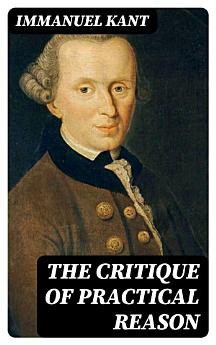The Critique of Practical Reason
Immanuel Kant
2022. g. maijs · DigiCat
E-grāmata
315
Lappuses
family_home
Piemērota
info
reportAtsauksmes un vērtējumi nav pārbaudīti. Uzzināt vairāk
Par šo e-grāmatu
In "The Critique of Practical Reason," Immanuel Kant meticulously explores the foundations of moral philosophy, presenting a thorough analysis of the nature of practical reason. Written in 1788 as the second of his critically acclaimed works, this treatise expounds upon the principles of ethics through a rigorous examination of human autonomy and the concept of duty. Kant's distinctive style, characterized by dense, yet eloquent prose, invites readers to engage deeply with his argumentation, which is firmly rooted in Enlightenment ideals, asserting that moral law is inherent to rational beings and can be apprehended through reason alone. Immanuel Kant, a pivotal figure of modern philosophy, was profoundly influenced by the scientific developments and philosophical debates of his time. His earlier works laid the groundwork for his ethical framework, emphasizing the importance of rationality and freedom in moral actions. Growing up amid the tumultuous changes of the late 18th century, Kant's thoughts reflect a synthesis of empirical observation and rational inquiry that continues to inform contemporary discussions on morality and ethics. This book is indispensable for anyone seeking to understand the intricacies of moral reasoning, as it not only elucidates Kant's ethical theories but also challenges readers to contemplate their own moral agency. Scholars, students, and enthusiasts of philosophy will find "The Critique of Practical Reason" to be a profound source of insight into the perennial questions surrounding duty, morality, and the role of reason in ethical decision-making.
Par autoru
Immanuel Kant (1724-1804), a central figure in modern philosophy, was born in Königsberg, Prussia (now Kaliningrad, Russia). He spent his entire life within the boundaries of this small university town, leading many to characterize his life as outwardly uneventful. However, the intellectual journey he undertook revolutionized philosophical thinking and continues to influence a broad spectrum of disciplines. Kant's 'The Critique of Practical Reason' (1788), the second of his critical works, delves into moral philosophy and sets the foundation for his moral theory, which pivots on the concept of the categorical imperative. This work follows his most famous book, 'The Critique of Pure Reason' (1781), which addresses the limitations and scope of human understanding. Known for his rigorous and systematic approach to philosophical problems, Kant sought to reconcile rationalism and empiricism and his ideas about autonomy, the moral law, and the nature of the human being as an end in itself had a profound impact on later philosophical thought and ethical theory. His style is characterized by a meticulous and often complex exposition of his thoughts, which has led to the development of a vast body of Kantian scholarship aimed at interpreting and analyzing his substantial contribution to philosophy.
Novērtējiet šo e-grāmatu
Izsakiet savu viedokli!
Informācija lasīšanai
Viedtālruņi un planšetdatori
Instalējiet lietotni Google Play grāmatas Android ierīcēm un iPad planšetdatoriem/iPhone tālruņiem. Lietotne tiks automātiski sinhronizēta ar jūsu kontu un ļaus lasīt saturu tiešsaistē vai bezsaistē neatkarīgi no jūsu atrašanās vietas.
Klēpjdatori un galddatori
Varat klausīties pakalpojumā Google Play iegādātās audiogrāmatas, izmantojot datora tīmekļa pārlūkprogrammu.
E-lasītāji un citas ierīces
Lai lasītu grāmatas tādās elektroniskās tintes ierīcēs kā Kobo e-lasītāji, nepieciešams lejupielādēt failu un pārsūtīt to uz savu ierīci. Izpildiet palīdzības centrā sniegtos detalizētos norādījumus, lai pārsūtītu failus uz atbalstītiem e-lasītājiem.








